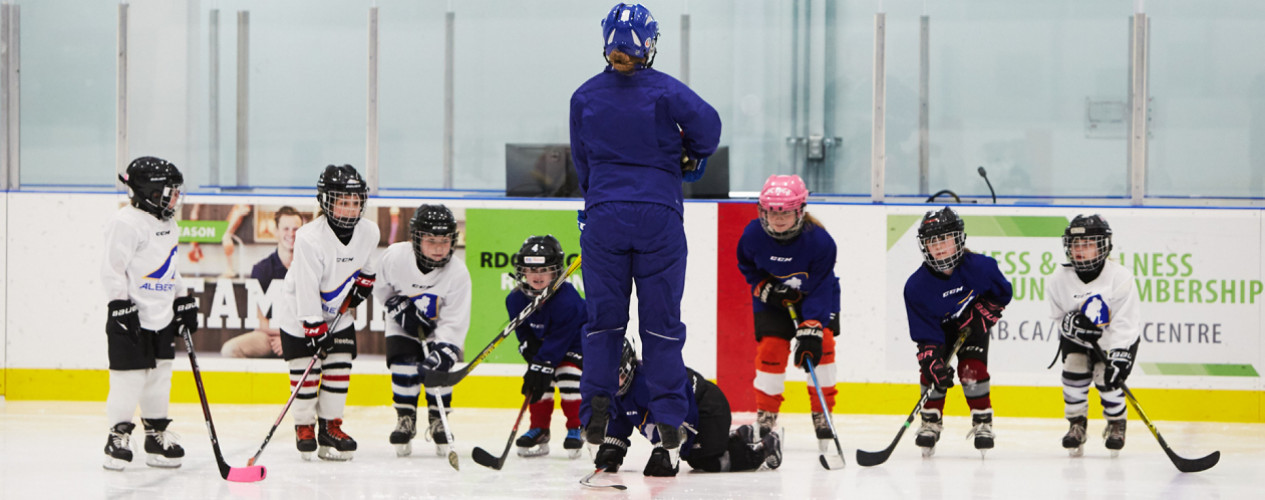Intro to Hockey
Hockey Alberta’s Intro to Hockey Model provides the general structural and administrative guidelines and specific playing rules for all players, ages 5-8 years.
The Intro to Hockey Model document is intended to help everyone better understand the Intro to Hockey model, and why it is important as the starting point for the development of young hockey players.
These rules and guidelines are required for all U7 and U9 hockey in Alberta.
Optional U9 Full Ice For February-March
Teams will be allowed to participate in full ice games starting in February through March of the hockey season. This is optional and provides a transition for primarily 8 year old players that will be moving to U11 the following hockey season.
If an association wishes to remain playing half ice games into February and March at the U9 level this will be permitted as well.
For more information, please contact:
Brett Kelly, Manager, Member Development
In addition to the resources available here on the Hockey Alberta website, helpful information is also available from these organizations:
| The Coaches Site | Ice Hockey Systems | Hockey Canada Network App | Hockey Canada Drill Hub |
| IIHF Development Hub | USA Hockey Practice Plans | USA Hockey Mobile Coach | National Skill Development Association |
- Logistics
- U7 Resources
- U9 Resources
- Half Ice Resources
- Smaller surfaces work
- Goalie Development
- Development Resources
|
|
Smaller ice surfaces = Enhanced skating development
On-ice study: smaller ice surfaces and skating development
In August 2016, Hockey Alberta partnered with Powerscout Hockey and St. Albert Minor Hockey to conduct a study on the effectiveness of smaller ice surfaces in skill development. The study featured 40 Initiation-aged players (five- and six-year-olds) who participated in a series of tests to collect data on a number of game and practice scenarios.
With regard to skating development, specific data for skating speed and acceleration was collected from the following scenarios:
• 200-foot sprints
• cross-ice games
• half-ice games, and
• a full ice game.
Overall, an analysis of the data and observation of the on-ice sessions reinforce that using a smaller ice surface at the Initiation level helps in the overall positive development of skating skills and skating acceleration for our youngest players, thereby better preparing them for when they are old enough to move to higher levels of hockey.
WHAT WE LEARNED
1. The average distance for the 5-6 year old players to reach top speed was 65 feet.
Why is this significant?
The distance 65 feet is exactly the distance from goal line to the nearest blue line (one zone) on a regulation-sized ice surface. A regulation ice surface is 200 feet x 85 feet. That means an average player CAN reach top speed in the cross-ice scenario and CAN EASILY reach top speed in a half-ice scenario. SPECIAL NOTE: The strongest skater needed only 60 feet to reach top speed, confirming the importance of acceleration.
2. Player acceleration speeds (m/s2) increased as the ice surface size was reduced.
Why is this significant?
Acceleration in the 200-foot (full-ice) sprints and the full-ice games was lower than in cross-ice and half-ice games. Puck movement and availability drives the speed of play, and young players want to “get the puck”. Observation showed that the players believed they had a better opportunity to get the puck when playing on half-ice or cross-ice, which resulted in increased acceleration in pursuing the puck.
SPECIAL NOTE: When looking at overall speed of the games, full-ice games had a higher average km/h rating — 0.8 km/h higher than half-ice, and 1.5 km/h higher than cross-ice games. However, observation noted a different kind of skating taking place in the full ice game — nine players chasing the puck carrier with fewer puck touches and fewer plays being made. These observations are in keeping with findings in similar studies done by USA Hockey.
3. The average sprint speed achieved in practice is double that of the average game speed.
Why is this significant?
To help develop a player’s skating skills and to become a faster skater, the practice environment is generally more conducive than games. There is a greater opportunity to skate faster for extended periods of time in practice than in a game.
SPECIAL NOTE: This data confirms the importance of practices, and practice to game ratios. The practice environment has a significant positive impact on skill development opportunities. A 3:1 practice to game ratio is recommended by Hockey Canada.
























